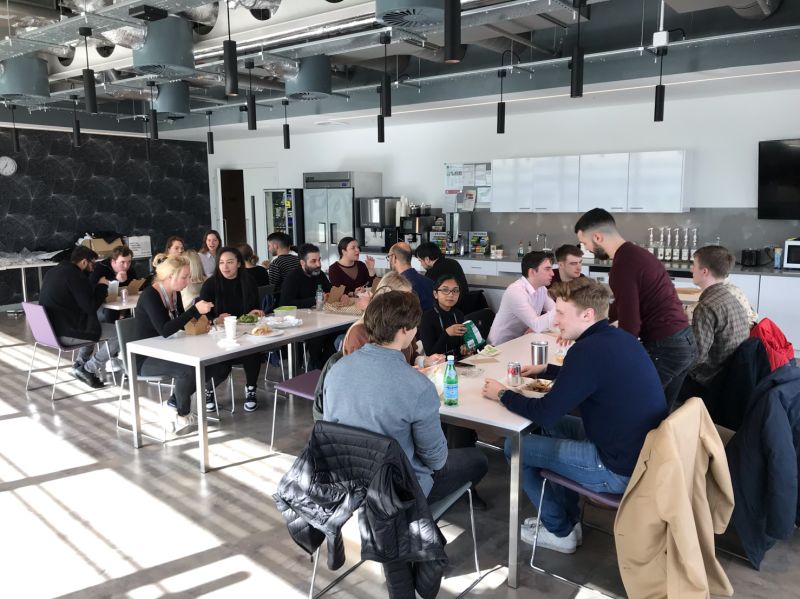Medidata: Don’t overlook internal talent
This attitude is helping the clinical development tech giant keep attrition low in the ‘Great Resignation’.
Why You Should Care
To keep up with customer demand, Medidata had to continue to grow its headcount.
The employer turned to tech to help, particularly with sourcing and onboarding.
Find out more, and why alumni and internal talent are helping the company thrive.
The work of pharmaceutical companies really came to the fore during COVID-19 pandemic.
As soon as it became clear that this novel coronavirus, that would become known as COVID-19, was going to be a serious public health emergency, pharma companies got straight to work.
At incredible speed, pharma companies sought to develop treatments and vaccines to help stem the coronavirus’s deadly impact on global health – and they were incredibly successful; vaccines were developed and licensed in record time.
However, it is important to remember that over the past two years pharma companies weren’t just busy developing treatments and vaccines for COVID-19, they also had to figure out how to do business as usual. Patients across the world were relying on these organizations for uninterrupted production of their medicines.
In addition, pharma companies make their money by continually innovating and trying to improve drugs and devices for patients without adequate treatment options. But social distancing disrupted the typical operation of clinical trials and studies, so these businesses relied more and more on their technology partners to support them with remote solutions.
One of these technology partners is a life sciences tech company called Medidata.
Headquartered in New York, Medidata provides software-as-a-service (SaaS) clinical development solutions, its mission is “powering smarter treatments for healthier people”, Andrew Bott, the company’s director of talent acquisition for EMEA and APAC, tells UNLEASH.
The impact of COVID-19 on Medidata
Bott shares that the impact of COVID-19 on the clinical trials meant that while many companies “put a big pause of hiring” during the pandemic, “it was the opposite at Medidata. We had to keep growing because our customers were demanding it”.
This was particularly the case for Medidata’s patient cloud business – this is a technology that helps to digitize clinical trials. Bott adds: “All of a sudden, [our] customers simply had to adopt more of these remote and sensor-based data solutions”, otherwise they wouldn’t be able to trial new drugs and remain profitable by selling them.
As a result, there were new expectations of the talent acquisition team – they now had to switch to hiring everyone remotely, onboarding everyone remotely, and doing all of that “faster than you were doing before”. “There were operational issues for sure, but we couldn’t, and didn’t, miss a beat”, notes Bott.
Technology was a help here, and Medidata was lucky that “there wasn’t…a technology void in our organization” – for instance, many of Medidata’s employees were already used to working remotely.
Instead, the main challenge came from figuring out how best to communicate with candidates and onboard new hires in this new working reality.
Switching from WebEx to Zoom helped significantly, as did leveraging Medidata’s new parent company Dassault Systèmes’ employee intranet platform. The acquisition was only completed in October 2019, and Medidata had to move quickly to adopt the technology “to reap its benefits in a more remote work”.
Other tools that helped Medidata during COVID-19 were technologies that help ensure “our job descriptions more appealing and written in a way that is generally more inclusive to support our diversity, equity and inclusion initiatives”.
“We’ve also had to rethink how we do ID verification to stay compliant” when doing background checks, notes Bott.
Winning the war for talent at Medidata
For Bott, technology has an important role to play in recruitment, but it shouldn’t be seen as a silver bullet. He notes that during COVID-19, “there were a lot of vendors out there…purporting to be the next best thing for sourcing or for onboarding”. It can be difficult to determine which technology is actually useful to the organization.
This is an ongoing job for Bott and his talent acquisition team. As part of this, Medidata is implementing a new CRM tool, it’ll be “really important to [help] us be able to communicate in more effective, varied, stimulating and interesting ways” – the technology should be live by the end of 2022.
Bott continues: “We continually try to drive a more digital-focused agenda”, particularly in terms of sourcing.
WWe need to operate where the candidates are, and that is predominantly digital these days”, so the team has “been doing a great deal of work on our employee value proposition to define ourselves more clearly digitally”.
On the topic of sourcing, UNLEASH was keen to know how Medidata is faring in the ‘Great Resignation’ – Bott shares that in EMEA “our attrition was up a little, not scarily so, [but it] is now coming back down”, and “our attrition is lower [now] than it was this time last year”.

Andrew Bott, director of talent acquisition for EMEA and APAC, Medidata.
Bott adds: “The ‘Great Resignation’ is, for us, less about the resignation and more a ‘war for talent’”.
Part of the reason why Medidata is faring well in the current challenging talent market is its mission, which makes it stand out from a large proportion of the tech sector.
“When we’re talking to technology candidates, we quickly move to the topic of the patient-centric work that we do”, explains Bott.
“A mission statement is one thing, but we work hard to connect the work that we are doing to patients. We try to bring [the mission statement of powering smarter treatment for healthier people] to life everyday.”
“I’ve worked in other areas of tech, and this patient-centric message is very powerful, so we hook onto that in a major way”, he adds.
Prioritizing internal and external talent
But Medidata isn’t just competing against the broad tech sector, it also has to battle with other companies in the clinal development space, who therefore have similar missions and patient-centric focuses.
Bott explains that the clinical development tech sector has “exploded in terms of investment” during the pandemic – and fueling that growth is talent.
To win in this hyper-competitive space, Bott argues that success comes from looking at both external and internal talent.
In terms of external talent, Medidata has become laser-focused on its sourcing. The company has also made some key hires in its talent team, including a VP of talent acquisition who is “putting expert sourcing skills in play into our teams locally”. The aim is to better support recruiters in identifying the right candidates for the right roles.
While sourcing has “been a key a cornerstone of putting the right skills into the team”, another focus has been internal talent mobility.
The external market “simply can’t sustain and provide all the talent that we need”, so Medidata has looked internally, and particularly at its early talent programs, including graduate and apprenticeship schemes.

Credit: Medidata.
A third element of Medidata’s talent strategies is a growth in boomerangs, former employees returning to work at the company.
“We welcome back strong performers with open arms, and if the right opportunity is there,” explains Bott. “Our industry is sufficiently small; we all know each other” and “we naturally keep in touch with those who have left”.
Bott notes that it each boomerang has a different reason for returning to Medidata, the mission and culture are why people come back.
“There’s no doubt that some of the [other] companies in the sector…don’t quite have the same culture”. This is particularly the case for the newer entrants to the market, who are still finding their feet.
Wellbeing at Medidata
Bott describes Medidata’s culture as “fun” – “we’re an organization where staff care about one another. We want to support each other professionally and personally”.
As a result, wellbeing is top of mind for Bott and the broader HR team.
During COVID-19, Medidata provided practical support to workers – for instance, in China where lockdowns have been particularly stringent, the employer ensured employees “had access to food and other suppliers”. This was all about “looking after their welfare”.
Medidata also provided wellbeing and mental health resources to all employees, and grew its mental health first aid team significantly. “That’s been a big initiative, and reflects the culture at Medidata and why people like working here.”
Bott notes that managers have particularly benefitted from these resources. “Certain managers will now need to learn how to manage their team remotely”, as well as how to look after their teams’ wellbeing.
“These resources are now there at a click of a button and it’s been hugely appreciated, certainly by me and I know by many others as well”, concludes Bott.
The world’s HR conference and expo is back! Don’t miss out on UNLEASH World in Paris this October. More here.
Sign up to the UNLEASH Newsletter
Get the Editor’s picks of the week delivered straight to your inbox!

Chief Reporter
Allie is an award-winning business journalist and can be reached at alexandra@unleash.ai.
